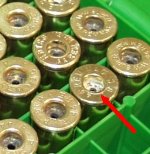Hello folks,
I am new to reloading and have been taking it slowly to make sure I don't blow anything up.
Finally got my reloading station completed and my press put together.
I own and have read (more than once) both the Lee and Lyman reloading books, so I do have some theoretical knowledge on this great new pastime, just no practical experience as yet.
First thing I did after getting everything set up was to decap and resize nearly 600 once-fired 44 magnum shells salvaged from factory ammo I had bought and fired over the years. That took awhile—and my arm is sore.
I am writing to get feedback from experienced reloaders on the matter of cleaning the primer pockets. Is this something you routinely do with each case, or only upon inspection and as indicated by.... ? I am including a representative sample picture of what my decapped once-fired shells look like, hoping that may help you to advise me. Your feedback is most appreciated.

I am new to reloading and have been taking it slowly to make sure I don't blow anything up.
Finally got my reloading station completed and my press put together.
I own and have read (more than once) both the Lee and Lyman reloading books, so I do have some theoretical knowledge on this great new pastime, just no practical experience as yet.
First thing I did after getting everything set up was to decap and resize nearly 600 once-fired 44 magnum shells salvaged from factory ammo I had bought and fired over the years. That took awhile—and my arm is sore.
I am writing to get feedback from experienced reloaders on the matter of cleaning the primer pockets. Is this something you routinely do with each case, or only upon inspection and as indicated by.... ? I am including a representative sample picture of what my decapped once-fired shells look like, hoping that may help you to advise me. Your feedback is most appreciated.

